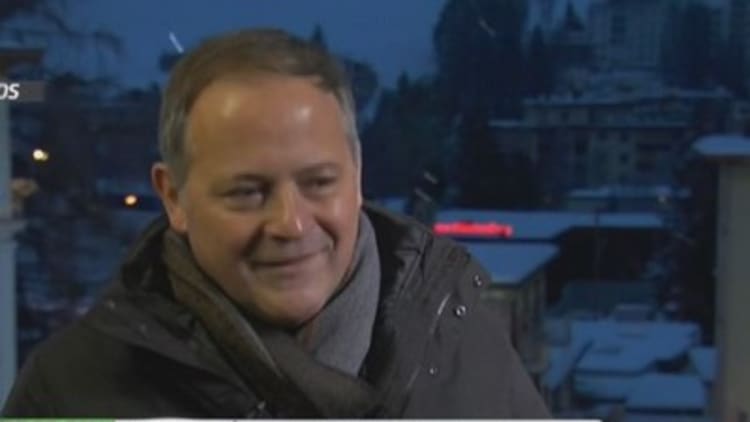Talk that the euro could weaken below $1 over the next 12 months is growing in currency circles a day after the European Central Bank (ECB) unleashed monetary stimulus to kick-start a weak economy.
The euro hit an 11-year low on Friday, falling below $1.12 for the first time since September 2003. It follows the ECB's decision to pump 60 billion euros ($68 billion) a month into the euro zone economy, and amid jitters ahead of Greece's general election this weekend.
Read More Live blog: Markets, experts react to European QE
"It's not our central view that we will get to parity or below, but I am aware that this view is out there and that the pace of the euro's decline has accelerated over the past month," said Jane Foley, a senior currency strategist at Rabobank in London. "And yes, the risk of further weakness appears to have increased."
The euro, which has shed around 18 percent of its value against the dollar in the past year, has tumbled over 8.5 percent over the past 30 days.
A move to or below the one-to-one level against the dollar implies a further fall of at least 11 percent.
"The divergence between the ECB, the BOJ (Bank of Japan) easing policy more, and the (U.S.) Federal Reserve… no matter how you slice it, the Federal Reserve will raise rates well before the ECB and the BOJ—I think that this pushes the euro well below parity next year," Brown Brothers Harriman currency expert Marc Chandler told CNBC's "Futures Now" on Thursday.
"I think about where the euro fell to back in the early part of 2000, 2001, we were down below $0.9. And I think that that's where we should be thinking that we're headed again," Chandler said.
Quantitative easing tends to put downward pressure on a currency on the premise that a central bank will print the money it needs to buy bonds and help push interest rates lower.
Read More Why we were right on QE: ECB board member
Speaking at a CNBC panel at the World Economic Forum in Davos Friday, billionaire investor George Soros said the quantitative easing by the ECB would impact currency markets.
"The sheer size of the massive injection and the duration, and so on, will have undoubtedly an effect," he said.

Greek factor
Adam Cole, global head of currency strategy at RBC Capital Markets, said that on top of monetary stimulus, the euro outlook was complicated by uncertainty over Greece, which votes for a new government on Sunday.
A win for the radical-left Syriza party, which is doing well in the opinion polls, could lead to a clash with Athens' international lenders – the European Union and International Monetary Fund-over the terms of its bailout package.
All Greek to me: What could happen in weekend vote
"There is the possibility that Greece might generate, not just on the day of the election, but for days and weeks another major uncertainty that will hang over the euro," said Cole.
"We think the euro could fall another three or four big figures from here on Greece specifically before we get some stability," Cole said, adding that parity was a possibility but not his central projection.
The euro's recent slide has fueled talk about how far the currency could fall in the coming year. In the wake of the ECB's policy move, Morgan Stanley revised down its year-end forecast for the euro to $1.05 from $1.12. Goldman Sachs earlier this month moved forward by a year its forecast for the euro to hit parity, to 2016.

Hold on
However, Rabobank's Foley said a move to parity could be stalled if the Fed believes the U.S. economy will suffer from dollar strength against the euro, and pushes back a possible rise in interest rates.
"You have to look at the Fed and wonder how happy it is to allow the dollar to be taking the strain of euro weakness," Foley said. "And I would argue that if the euro were to get anywhere close to parity, the Fed would take action and that would mean the chances of it hiking interest rates this year diminishes."
Asked about the prospect of the euro slipping below the significant $1-level, ECB executive board member Benoit Coeuere told CNBC on Friday: "We don't have an exchange rate target, we do monetary policy and we do the monetary policy in the way that is a fit to our inflation target."

